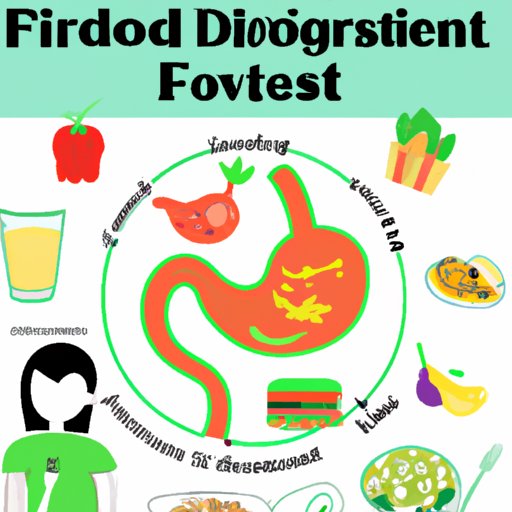Introduction
Eating too quickly can lead to many uncomfortable and even painful symptoms, such as abdominal pain and bloating. It can also lead to weight gain and an increased risk of developing digestive disorders. Fortunately, there are several strategies you can use to help alleviate these symptoms and reduce your chances of developing more serious health problems. In this article, we’ll explore how to relieve stomach pain from eating too fast and provide tips for eating more slowly and mindfully.
Eating Slowly and Chewing Food Thoroughly
The first step in relieving stomach pain from eating too fast is to slow down and chew your food thoroughly. Eating slowly allows your brain to register when you’ve eaten enough and helps prevent overeating. It also gives your digestive system time to process the food and absorb the nutrients. According to a study published in the journal Physiology and Behavior, people who ate slowly had lower levels of ghrelin, a hormone that stimulates hunger. This suggests that eating slowly may help reduce hunger and cravings.
Here are a few tips for slowing down while eating:
- Put your fork or spoon down between bites.
- Chew each bite of food at least 10 times.
- Eat with your non-dominant hand.
- Take small sips of water between bites.
- Set a timer and try to take at least 20 minutes to finish a meal.
Avoid Overeating
Overeating can cause feelings of fullness and discomfort, which can lead to stomach pain. To help prevent overeating, it’s important to be mindful of portion sizes and limit processed and high-calorie foods. Instead, focus on eating whole foods that are packed with nutrients and fiber.
Here are a few strategies for limiting portion sizes:
- Fill half your plate with vegetables.
- Choose lean proteins like fish, chicken, and tofu.
- Opt for complex carbohydrates like quinoa, sweet potatoes, and brown rice.
- Avoid oversized portions and second helpings.
- Drink a glass of water before meals to help you feel fuller faster.
Drink Plenty of Water
Drinking plenty of water throughout the day can help relieve stomach pain caused by eating too fast. Water helps keep your digestive system running smoothly and prevents constipation, which can make stomach pain worse. It also helps flush out toxins and keep your body hydrated.
Most experts recommend drinking 8–10 glasses of water per day. However, the amount of water you need may vary depending on your activity level, the climate you live in, and other factors. If you’re not sure how much water you should be drinking, talk to your doctor.
Take an Over-the-Counter Antacid
If you’ve already eaten too quickly and are experiencing stomach pain, an over-the-counter antacid may provide relief. Antacids work by neutralizing stomach acid and reducing irritation in the digestive tract. Common antacids include calcium carbonate (Tums), magnesium hydroxide (Milk of Magnesia), and aluminum hydroxide (Maalox).
It’s important to read the label carefully and follow the instructions provided. Most antacids should be taken after meals, but some can be taken before meals to help prevent indigestion. If you’re unsure when to take an antacid, talk to your doctor or pharmacist.

Avoid Foods That Irritate the Digestive System
Certain foods can irritate the digestive system and trigger stomach pain. Common culprits include spicy foods, fried foods, dairy products, caffeine, and alcohol. If you’re prone to stomach pain after eating too fast, it may be helpful to avoid these foods or substitute them with healthier alternatives.
For example, you could opt for unsweetened almond milk instead of cow’s milk, or choose roasted nuts instead of fried snacks. You can also try adding soothing herbs and spices, such as ginger and turmeric, to your meals. These ingredients can help reduce inflammation and support digestion.
Exercise Regularly
Regular physical activity can help improve digestion and reduce stomach pain. Exercise helps stimulate the digestive system, which can help move food through the intestines more quickly. It can also reduce stress, which can help reduce symptoms of indigestion.
The type of exercise you do isn’t as important as simply getting moving. Some good options include walking, jogging, biking, swimming, and yoga. Aim for 30 minutes of moderate-intensity activity most days of the week.
Conclusion
Stomach pain from eating too fast can be a sign that you’re not taking care of your digestive health. Fortunately, there are several steps you can take to help relieve the discomfort and get back on track. Eating slowly and chewing your food thoroughly, avoiding overeating, drinking plenty of water, taking an over-the-counter antacid, avoiding foods that irritate the digestive system, and exercising regularly can all help reduce stomach pain and improve your overall health.
(Note: Is this article not meeting your expectations? Do you have knowledge or insights to share? Unlock new opportunities and expand your reach by joining our authors team. Click Registration to join us and share your expertise with our readers.)
